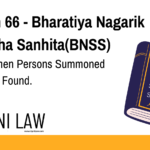Section 67: Procedure When Service Cannot Be Effected As Before Provided
Code: Section 67 BNSS
If service cannot by the exercise of due diligence be effected as provided in
section 64, section 65 or section 66, the serving officer shall affix one of the duplicates of the
summons to some conspicuous part of the house or homestead in which the person
summoned ordinarily resides; and thereupon the Court, after making such inquiries as it
thinks fit, may either declare that the summons has been duly served or order fresh service
in such manner as it considers proper.
Explanation of Section 67 BNSS
Key Provisions
- When does this apply?
- When the summons cannot be served personally to the person.
- When no adult family member is available to accept the summons (as per Section 66 BNSS).
- When the person is deliberately avoiding service.
- Alternative Method: Affixation of Summons
- The summons is affixed to a visible location (such as the main door of the house).
- This ensures that the summoned person becomes aware of the summons.
- Court’s Role
- The Court will verify whether the service was proper.
- If satisfied, it may treat the summons as duly served.
- If not, it may order fresh service using another method.
Illustration of Section 67 BNSS
Example 1: Summons to a Person Evading Service
A fraud case is filed against Mr. Sharma, but he intentionally avoids the police officer.
- The officer tries multiple times to serve the summons.
- No family member is available to accept it.
- The officer affixes the summons to the front gate of Mr. Sharma’s house.
- The Court later declares the summons as duly served.
Example 2: Fresh Summons Ordered
A summons is issued against Ms. Priya, but:
- Her house is locked, and she is out of town.
- The officer affixes the summons to her door.
- The Court verifies that she was not available and orders fresh summons service by registered post.
Common Questions and Answers on Section 67 BNSS
1. Can the police directly declare a summons as served after affixing it?
🚫 No, only the Court has the authority to declare that the summons has been duly served.
2. Where should the summons be affixed?
✅ The summons should be affixed on a conspicuous part of the house or homestead, such as the main entrance or gate.
3. What if the summoned person removes the affixed summons?
✅ Once affixed, it is legally considered served. The Court decides whether service was valid.
4. Can the Court reject the affixed summons and order fresh service?
✅ Yes, the Court may order fresh service if it believes the affixed summons was not properly served.
5. What happens if the summoned person does not respond after affixation?
✅ The Court may proceed with the case, treating the summons as duly served.
Conclusion
Section 67 BNSS ensures that summons service cannot be avoided by:
✅ Providing affixation as a last resort,
✅ Giving the Court the authority to verify service, and
✅ Allowing fresh service if necessary.
This provision prevents deliberate evasion of summons and maintains legal efficiency.
For more legal insights, visit ApniLaw today! 🚀










